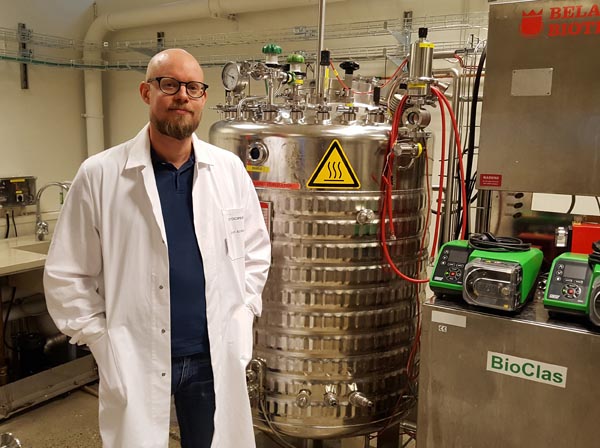Bacterial Nanocellulose Can Be Strength Enhancer in Board, Textiles, Bioplastics
![]() Print this Article | Send to Colleague
Print this Article | Send to Colleague
In a joint research project, Umeå University and Processum (both in Sweden) will develop methods for production of bacterial nanocellulose (BNC) from residual streams from the pulp and paper industry. The aim is to produce sufficient quantities of bacterial nanocellulose to be tested as additive in board, textile, and bioplastics applications. Collaboration with companies from the paper and pulp industry as well as companies on the application side is thus welcome.
Different types of nanocellulose can give new and improved characteristics to a number of different materials. So far, research as well as most demonstration and production efforts have primarily been focused on cellulose nanofibers (CNF), and cellulose nanocrystals, (CNC). In this project, researchers from Umeå University and Processum will develop and scale up a method for production of BNC. As the name says, the nanocellulose is produced by bacteria.
"At Umeå University, our research group has already been able to produce bacterial nanocellulose in laboratory scale based on a residual stream from a pulp mill," said Professor Leif Jönsson, who is in charge of the research group. "We have produced small amounts of BNC which we have added to paper with promising results. The paper got improved mechanical characteristics, i.e. higher tensile and tear index. Nanocellulose produced with the aid of bacteria differs from CNF and CNC. It is purer, has a higher degree of polymerisation, is more crystalline, and thinner."
Björn Alriksson, Head of Group -Biotechnology at Processum, noted that "the way to produce bacterial nanocellulose today is expensive as the methods are inefficient and the growth medium is expensive. This is why we will use low-value residual streams from pulp mills as substrate and the production will be carried out in stirred bioreactors to try to improve the production. In this project, we will scale up the process starting in our laboratory scale multibioreactors, then continue with experiments in our 50 liter bioreactor and, finally, we will produce BNC in a 600 liter reactor."
The BNC will then be tested in applications such as strength enhancer in board, textiles, and plastics. The goal is to produce BNC from industrial residual streams for applications where relatively high volumes of BNC are needed.
"Nanocellulose research has for years been a strong area within RISE. The cooperation between Processum and Umeå University really complements the research activities done on MFC/NFC and CNC," said Pernilla Walkenström, acting division manager, RISE Bioeconomy.
"BNC is a very interesting product, which can give improved characteristics to existing materials and can also be used for production of entirely new bio-based materials," said Leif Jönsson and Björn Alriksson. "At the end of the project, we will hopefully have enough BNC for realistic application tests. This means that we are open to national as well as international cooperation in different fields for a joint development of interesting applications."
For more information, contact: Leif Jönsson professor, , Department of Chemistry, Umeå University, Tel. +46 90 786 68 11; Björn Alriksson, head of group- Biotechnology, Processum, Tel. +46 10 516 67 53.

In photo above, Björn Alriksson, Processum, standing by one of Processum’s bioreactors in which bacterial nanocellulose will be produced.
Processum started in 2003 and has developed from a technology park in Írnsköldsvik, Sweden, to a leading biorefinery initiative, both nationally and internationally. The major parts of the activities concern support and initiatives regarding research and development in the areas of biotechnology, energy technology, inorganic chemistry, organic chemistry, and raw materials with a focus on sustainability. Together with other biorefinery initiatives along the coast of the northern part of Sweden, and together with the universities, form an important hub for development of new products, energy solutions and fuels based on wood raw material. Processum hosts the growth initiative, The Biorefinery of the Future. RISE Processum AB is owned 60 % by RISE Research Institutes of Sweden and 40% by the 20 member companies forming the Processum Interest Group.


